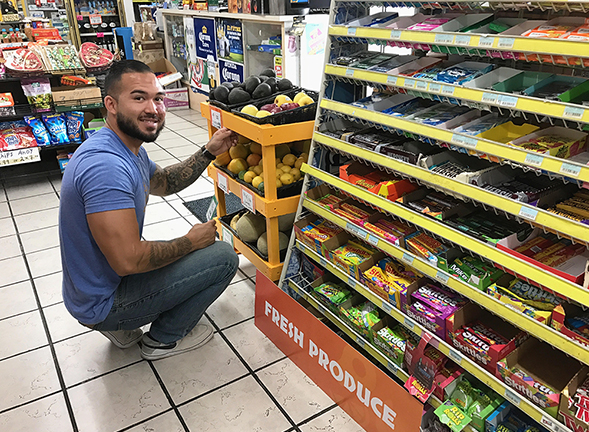SDSUs BrightSide Produce: A Lesson in Business and Humanity
The student-run program delivers fresh fruits and vegetables to small stores located in underserved communities and food deserts.

“Students benefit from direct experience working on a social venture and managing all aspects of the operation, while making a difference in the community.”
The idea is simple. The problem is much more complex. Students at San Diego State University, guided by Iana Castro, associate professor of marketing in SDSU’s Fowler College of Business, are working to tackle food insecurity in low-income communities—one produce delivery at a time.
It’s been less than a year since Castro started BrightSide Produce at SDSU. Based on a model developed in 2014 at the University of St. Thomas in Minnesota, the program distributes fresh fruits and vegetables to small food stores and liquor stores in underserved communities. This includes shops located in food deserts, where residents do not have access to supermarkets.
“The BrightSide Produce program was developed as a direct response to two needs: a need for an innovative, pedagogical approach that could elevate the student experience while preparing students for the workplace; and a need to develop a solution to a pressing issue that is affecting communities nationwide, including many San Diego communities,” said Castro.
BrightSide, which operates as a non-profit, acts as the workaround for small shops that can’t afford to purchase the minimum order requirement from produce distribution companies. BrightSide buys the produce directly from produce distributors and then delivers the produce to participating stores. It’s a solution that allows small business owners to successfully and profitably stock produce.
The other part of the program centers on the BrightSide Produce Buyer’s Club, where members sign up for produce packages, and then pick up their produce at SDSU’s farmers market held every Thursday on campus. Proceeds from the Buyer’s Club help fund deliveries to BrightSide stores.
Students enrolled in Castro’s upper division marketing class, Marketing and Sales for Social Impact, help run the non-profit. They are given positions within functional teams in BrightSide and handle everything from store relations and operations to marketing and communications. The semester-long class is currently offered as a “special topics course,” but is going through the process to make it a permanent part of the marketing curriculum, Castro said.
“These stores wouldn’t have produce, if we weren’t the ones delivering it to them. I think having the interactions, being in the stores, stocking the produce and taking out the spoils, it just opens your eyes to the fact that some communities don’t have the resources they should,” said Shannon Reynolds, who leads BrightSide’s marketing and communications team. “I can’t imagine going to a store and not being able to buy produce because it’s not there.”
Since the start, BrightSide has nearly tripled the number of stores it serves. Currently, all participating stores are located in National City, but the group would like to expand throughout the greater San Diego region.
“The program provides students with valuable hands-on experience embedded in business curriculum. Students are running a business that is addressing a need in the local community, one that existing business models have been unable to address,” said Castro.
“It is teaching students about the importance of social innovation, community impact, sustainability and caring about the greater good. Students benefit from direct experience working on a social venture and managing all aspects of the operation, while making a difference in the community.”



